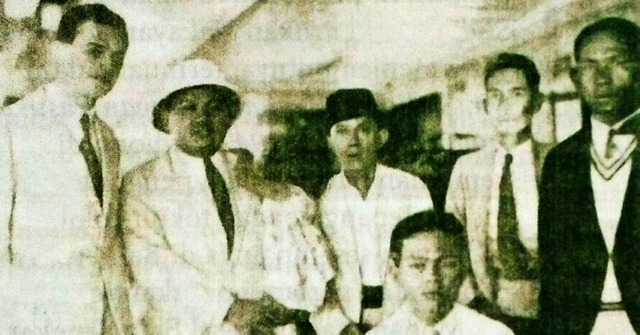Indonesian Youth Choose to Study in Sakura

Left-right: Mr. Nabilicy, Parada Harahap, Gatot Mangoenpradja, Sjoeaib Sastradiwirja, Panangiang Harahap, and Soedibio (seated). Repro Menoedjoe Matahari Terbit.
Japan's military victory over Russia in the Tsushima War in 1904-1905 hoisted Japan's image as a developed country. Its economic expansion is also astounding. Thousands of legendary "Japanese Shop" outlets are scattered in the Indies and provide the need for goods at low prices. Many Indonesians go to Japan to learn from Japanese economic progress.
According to Peter Post, because it was threatened, in 1933, the Indian government abandoned a policy of "open politics" and began to intervene in economic matters. Protection is implemented to protect the textile industry and large Dutch trading companies. On the contrary, because the protection policy threatens its economic foundation, Japan calls for Pan-Asia.
"This call fell on fertile land and was picked up by the nationalist movement," wrote Peter Post in an introduction to the book The Encyclopedia of Indonesia in the Pacific War.
A number of Indonesian nationalist figures turned their attention to Japan. Some of them visited Japan. One of them is Parada Harahap, editor of the Batavia Bintang Timoer newspaper.
In November 1933 until January 1934, Parada led a trade and industry delegation visiting Japan. In the memoir of his trip to the Sunrise Minister, which was published in 1934, he praised Japan's progress. He also called on Indian students to shift their attention from European education to Sakura.
"Where should we go to study? To Japan, of course! "Parada wrote.
One of the young men who participated in the Parada group was Sudibjo Tjokronolo, a graduate of Algemeene Middelbare School or equivalent to a high school in Batavia. Initially Sudibjo dreamed of continuing school in the Netherlands as most other Indies educated groups. Due to lack of fees, Sudibjo shifted his eyes to Japan.
"My Japanese value is sufficient for schools there. Can't Japan win the war with Russia, a Western country. "Isn't the Japanese classed as the European nation," Sudibjo Tjokronolo wrote, contained in the Indonesian Students' Joy in Japan, written by the Persada Senior team, an Indonesian student alumni organization that had studied in Japan. "Japan has a national spirit that can be learned and modeled."
At that time Japan offered school fees that were cheaper than the Netherlands. There was once a rumor in the environment of Indonesian scholars that life in Japan at that time could be enough for 50-80 Yen a month. If in the Netherlands, it can be three to four times.
Everything that smelled of Japan did not get the attention of the Dutch East Indies government. In a report published in 1942, the Indian government called for "subversive activity" of Japanese people, from tourists to scientists, from trade representatives to spies, for a decade. They moved the Pan-Asian campaign through publishing, financial support and distribution of cheap goods, to encourage Indies people to study in Japan at a low cost. The goal: for the bumiputera to fight the Indian government.
"A few dozen young people are interested, with the cheap education offered to them and the financial support promised to people who can't even afford this low cost, going to Japan," the Dutch Information Bureau wrote in Ten Years of Japanese Burrowing in the Netherlands. East Indies.
The report also mentions, upon arrival in Japan, young people who are ready to act as Japanese propaganda tools are financially aided. "They are often invited to attend Pan-Asian group meetings. At the congress they were proposed as 'Indonesians' and leaders of races who had risen against the Dutch oppressors, "the report wrote.
For Japan itself, control of Southern countries is an obligation under political doctrine compiled by the Greater Asia Association (Dai Ajia Kyokai), an influential organization in Tokyo which was established in January 1933. Reaffirmed by Prince Konoye's statement acting as prime minister in February 1938 that Japan was responsible for establishing a new era in East Asia, namely the commonwealth of the Free Asian People.